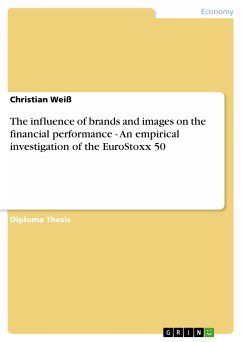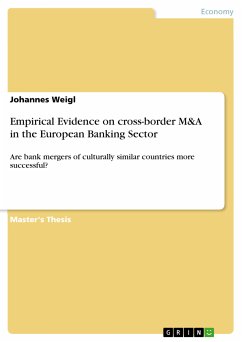Diploma Thesis from the year 2007 in the subject Business economics - Banking, Stock Exchanges, Insurance, Accounting, grade: 2,3, University of Regensburg, language: English, abstract: There are many consultancies, for example, Interbrand, Brand Finance or Batten, Barton, Durstine & Osborn (BBDO) that create annual lists of companies ranked by their brand value. Over the years, these popular rankings have become more and more relevant to companies because they are of the opinion that they can thereby increase their degree of popularity. Therefore, an interesting question arises: Is there any connection between the company's brand value and its financial performance? The list of the one hundred most valued brands published by Interbrand, probably the most famous global branding consultancy of the world, has made its contribution to the increased popularity of brand value, not only in the United States but meanwhile also in Europe. If you peruse the best global brands 2006 list attentively, you will observe that nearly half of the companies, exactly 49%, are non-US companies, compared to only 37% in the year 2001. 37 of the 100 companies are from Europe, with Nokia as the most valuable European brand ranked as number six. Moreover, nine companies are based in Germany, sorted by brand value: Mercedes, BMW, SAP, Siemens, Volkswagen, adidas, Audi, Porsche, and Nivea. Further evidence for the raised acceptance and attractiveness of intangible assets, brand value included, provides the fact that since the early 1980s the share of intangible assets of concerns has increased from an average of 40% in their brand value to over 80% by the end of the 1990s. As a result, only about 20% of a company's brand value will be recorded by the accounting system. Thus, it is difficult for the companies to explain this overvalue to the shareholders. The first part of this paper deals with intangible assets in general. The first part concludes with the description of the results of other empirical studies about the connection between brand value and stock performance. The second part of the working paper examines the relationship between brand value and stock performance of the EuroStoxx 50 companies. First, the empirical analysis is described, followed by the presentation of the results of the investigation. These results are then summarised and interpreted. The information criteria will be explained hereafter. Finally yet importantly, the statistical tests based on the results of the study are summed up.
Dieser Download kann aus rechtlichen Gründen nur mit Rechnungsadresse in A, B, BG, CY, CZ, D, DK, EW, E, FIN, F, GR, HR, H, IRL, I, LT, L, LR, M, NL, PL, P, R, S, SLO, SK ausgeliefert werden.









